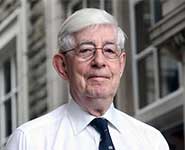
Emeritus Professor Peter Wells CBE FRS
23 July 2013
Emeritus Professor Peter Wells CBE FRS, from the School of Clinical Sciences, has been awarded the Royal Society’s 2013 Royal Medal for interdisciplinary sciences.
Professor Wells received the award for pioneering the application of the physical and engineering sciences to the development of ultrasonics as a diagnostic and surgical tool, which has revolutionised clinical practice.
The three Royal Medals, also known as the Queen’s Medals, are awarded annually by the Sovereign on the recommendation of the Council of the Society.
Each year two medals are awarded for the most important contributions “to the advancement of Natural Knowledge” in the physical and biological sciences respectively. A third medal is awarded for distinguished contributions in the applied sciences.
The Royal Medals were founded by HM King George IV in 1825. Between 1826 and 1964 two medals were awarded each year. In 1965 the third medal, covering the applied sciences, was introduced on behalf of HM The Queen. The three medals are of silver gilt and are accompanied by a gift of £5,000.
Further information
About the Royal Society
The Royal Society is a self-governing Fellowship of many of the world’s most distinguished scientists drawn from all areas of science, engineering, and medicine. The Society’s fundamental purpose, as it has been since its foundation in 1660, is to recognise, promote, and support excellence in science and to encourage the development and use of science for the benefit of humanity.
The Society’s strategic priorities emphasise its commitment to the highest quality science, to curiosity-driven research, and to the development and use of science for the benefit of society. These priorities are:
1. Promoting science and its benefits
2. Recognising excellence in science
3. Supporting outstanding science
4. Providing scientific advice for policy
5. Fostering international and global cooperation
6. Education and public engagement
